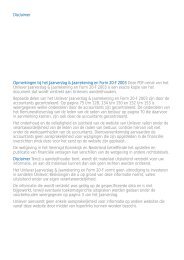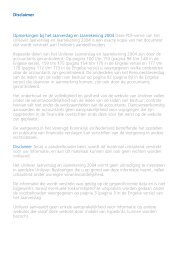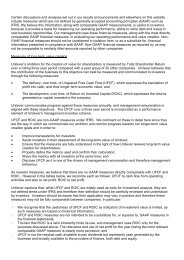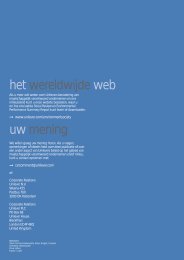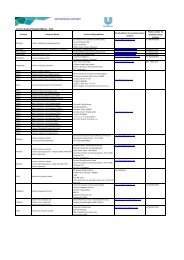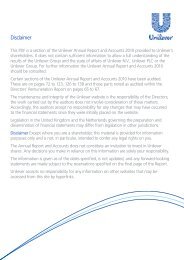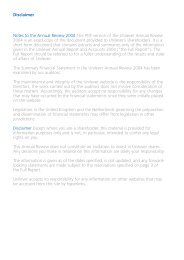Unilever Annual Report & Accounts and Form 20-F 2000
Unilever Annual Report & Accounts and Form 20-F 2000
Unilever Annual Report & Accounts and Form 20-F 2000
- TAGS
- unilever
- annual
- accounts-and-form
- f
Create successful ePaper yourself
Turn your PDF publications into a flip-book with our unique Google optimized e-Paper software.
36<br />
<strong>Unilever</strong> <strong>Annual</strong> <strong>Report</strong> & <strong>Accounts</strong> <strong>and</strong> <strong>Form</strong> <strong>20</strong>-F <strong>20</strong>00 <strong>Report</strong> of the Directors<br />
Remuneration report<br />
<strong>Report</strong> to the shareholders<br />
The following comprises the report to shareholders by the<br />
Boards. In drawing up this report, the Boards have taken<br />
into account the recommendations of the Committee on<br />
Corporate Governance in the Netherl<strong>and</strong>s (Peters Committee).<br />
The Boards have also given full consideration to the<br />
Combined Code (‘the Code’) appended to the United<br />
Kingdom Listing Rules in framing the remuneration policy.<br />
PLC‘s statement of compliance with respect to the Code is<br />
on page 32. This report deals with any non-compliance with<br />
the Code in the area of remuneration policy.<br />
The Boards are guided by a Remuneration Committee<br />
comprising F H Fentener van Vlissingen (Chairman),<br />
B Collomb <strong>and</strong>, with effect from 9 May <strong>20</strong>00, Lord Simon<br />
of Highbury. Sir Derek Birkin was a member of the<br />
Remuneration Committee until May <strong>20</strong>00.<br />
The Remuneration Committee makes recommendations<br />
to the Boards on <strong>Unilever</strong>’s framework of executive<br />
remuneration. The Committee determines, on the Boards’<br />
behalf, specific remuneration packages for members of the<br />
Board, including pension rights, grants of share options <strong>and</strong><br />
any compensation payments.<br />
Remuneration of Directors <strong>and</strong> Executive Officers<br />
The aggregate amount of remuneration paid by the <strong>Unilever</strong><br />
Group to all directors <strong>and</strong> executive officers for services in all<br />
capacities during <strong>20</strong>00 was €16 029 915 (£9 757 049).<br />
The aggregate amount set aside by the <strong>Unilever</strong> Group<br />
during <strong>20</strong>00 to provide pension, retirement or similar<br />
benefits for directors <strong>and</strong> executive officers was €831 962<br />
(£506 368).<br />
Policy: directors’ emoluments<br />
The objective of <strong>Unilever</strong>’s remuneration policy for directors<br />
is to motivate <strong>and</strong> retain top class business people able to<br />
direct <strong>and</strong> lead a large global company, <strong>and</strong> to reward them<br />
accordingly based on performance.<br />
The Remuneration Committee believes that the level of<br />
remuneration of Dutch or British directors resident in their<br />
home countries should be in line with that of executive<br />
directors of major international industrial companies based<br />
in the Netherl<strong>and</strong>s <strong>and</strong> the United Kingdom respectively,<br />
who have similar responsibilities to a <strong>Unilever</strong> director whilst<br />
recognising <strong>Unilever</strong>’s size <strong>and</strong> special features. The levels<br />
of remuneration of the Chairmen <strong>and</strong> the members of<br />
the Board take into account their special responsibilities <strong>and</strong><br />
provide differentials comparable with those found in other<br />
major international industrial companies. A director who<br />
is not resident in his home country is paid at the level of<br />
remuneration appropriate to his place of residence if this is<br />
higher than that in his home country. Directors not of Dutch<br />
or British nationality are, in principle, to be no worse off<br />
than they would be if based in their home country in a<br />
job of comparable importance.<br />
Levels of remuneration are reviewed annually by the<br />
Remuneration Committee in the light of external expert<br />
advice which assesses competitive levels of remuneration in<br />
the largest companies relevant to the residence of the group<br />
of <strong>Unilever</strong> directors concerned. Comparison is also made<br />
with the remuneration of other employees within <strong>Unilever</strong>.<br />
The Remuneration Committee’s policy is to seek to link reward<br />
closely to performance by using merit pay increases <strong>and</strong><br />
bonuses based on both corporate <strong>and</strong> personal performance.<br />
NV <strong>and</strong> PLC <strong>and</strong> their group companies constitute a single<br />
group. It is therefore the practice for directors to receive<br />
emoluments from both NV <strong>and</strong> PLC because they serve both<br />
companies. Emoluments, wherever stated, include payments<br />
from both NV <strong>and</strong> PLC. All emoluments <strong>and</strong> fees earned by<br />
directors from outside directorships <strong>and</strong> like sources are<br />
required to be paid to <strong>and</strong> are retained by <strong>Unilever</strong>.<br />
All directors’ emoluments, including those of the Chairmen,<br />
are made up of the following elements:<br />
(i) Salary:<br />
Salaries are fixed by the Remuneration Committee. They are<br />
usually fixed in the currency appropriate to the location, the<br />
Netherl<strong>and</strong>s, United Kingdom or United States, where the<br />
director is based.<br />
(ii) Allowances <strong>and</strong> value of benefits in kind:<br />
In appropriate cases, <strong>and</strong> usually in accordance with the<br />
same rules as apply to all qualifying employees, directors<br />
receive allowances to help them meet expenses incurred<br />
by virtue of their employment, for example, in respect<br />
of relocation <strong>and</strong> consequential disturbance <strong>and</strong> education<br />
expenses. Certain of the London based directors receive<br />
an allowance to take account of the fact that part of their<br />
remuneration is paid in the Netherl<strong>and</strong>s. Benefits in kind<br />
are items such as a company car <strong>and</strong> medical insurance.<br />
(iii) Performance related payments:<br />
These arise primarily under an annual bonus scheme.<br />
Bonuses are set by the Remuneration Committee. The<br />
maximum cash bonus for directors for the year <strong>20</strong>00 is<br />
60% of salary. Bonuses are based on achievement of<br />
a target or target range which involve two measures<br />
of performance:<br />
(a) a corporate target; <strong>and</strong><br />
(b) individual targets.<br />
The corporate target is based on a combination of the<br />
increase in earnings per share <strong>and</strong> turnover expressed in<br />
euros <strong>and</strong> in pounds sterling. The individual targets are<br />
based on previously agreed key objectives.<br />
Starting with the payment in <strong>20</strong>01 of the bonus for <strong>20</strong>00,<br />
one quarter of the annual bonuses for directors are paid in<br />
shares in NV <strong>and</strong> PLC <strong>and</strong> the directors are then awarded<br />
shares of equivalent value, upon condition that all the<br />
shares are retained for at least three years.



